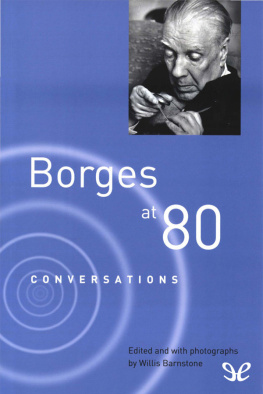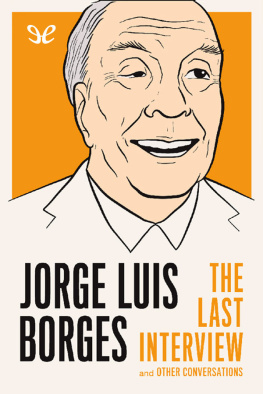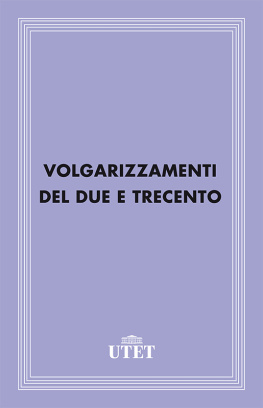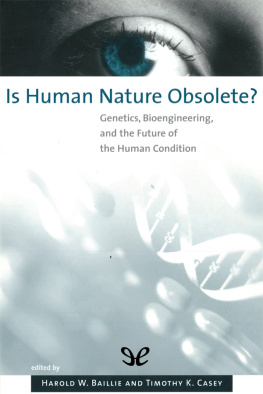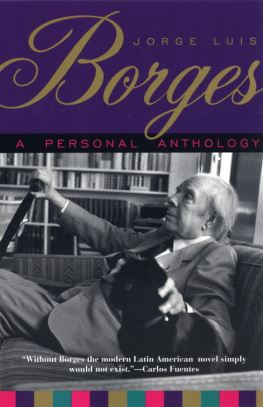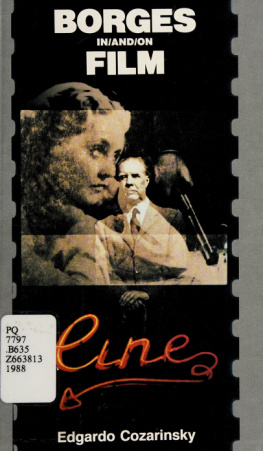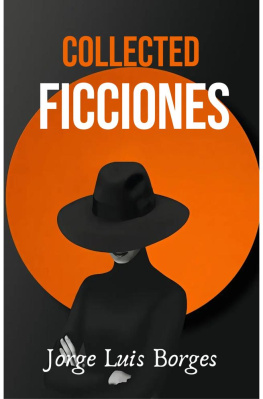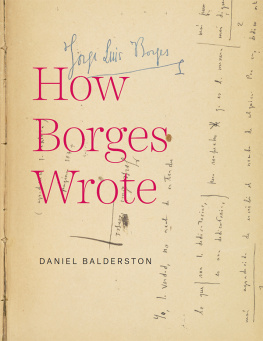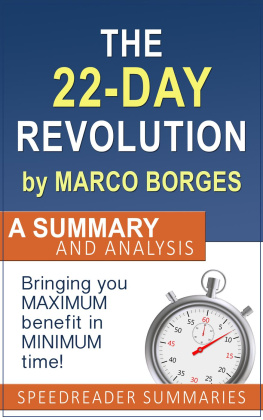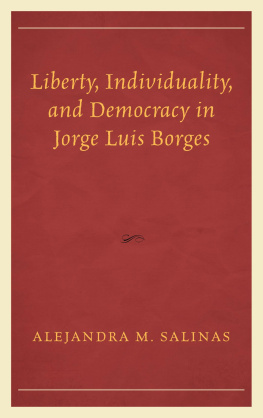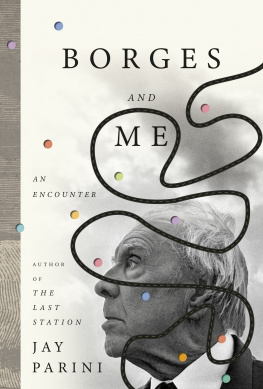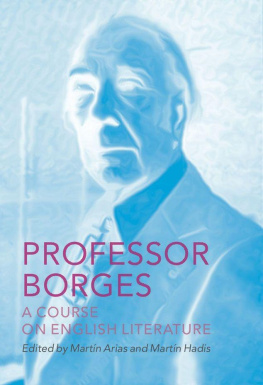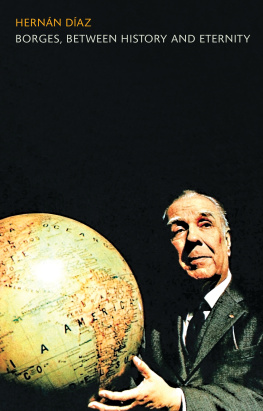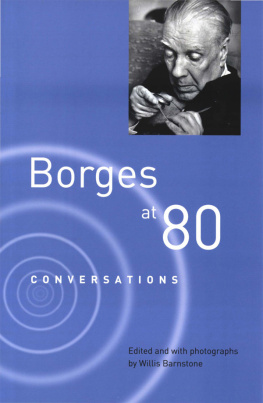AA. VV. - Borges at Eighty
Here you can read online AA. VV. - Borges at Eighty full text of the book (entire story) in english for free. Download pdf and epub, get meaning, cover and reviews about this ebook. year: 1982, publisher: ePubLibre, genre: Art. Description of the work, (preface) as well as reviews are available. Best literature library LitArk.com created for fans of good reading and offers a wide selection of genres:
Romance novel
Science fiction
Adventure
Detective
Science
History
Home and family
Prose
Art
Politics
Computer
Non-fiction
Religion
Business
Children
Humor
Choose a favorite category and find really read worthwhile books. Enjoy immersion in the world of imagination, feel the emotions of the characters or learn something new for yourself, make an fascinating discovery.
Borges at Eighty: summary, description and annotation
We offer to read an annotation, description, summary or preface (depends on what the author of the book "Borges at Eighty" wrote himself). If you haven't found the necessary information about the book — write in the comments, we will try to find it.
AA. VV.: author's other books
Who wrote Borges at Eighty? Find out the surname, the name of the author of the book and a list of all author's works by series.
Borges at Eighty — read online for free the complete book (whole text) full work
Below is the text of the book, divided by pages. System saving the place of the last page read, allows you to conveniently read the book "Borges at Eighty" online for free, without having to search again every time where you left off. Put a bookmark, and you can go to the page where you finished reading at any time.
Font size:
Interval:
Bookmark:

A collection of interviews now available from New Directions for the first time. The words of a genius: Borges at Eighty transcends our expectations of ordinary conversation. In these interviews with Barnstone, Dick Cavett, and Alastair Reid, Borges touches on favorite writers (Whitman, Poe, Emerson) and familiar themes labyrinths, mystic experiences, and death and always with great, throw-away humor. For example, discussing nightmares, he concludes, When I wake up, I wake to something worse. It's the astonishment of being myself.

AA. VV.
Conversations
ePub r1.0
Titivillus 25.06.16
Original title: Borges at Eighty: Conversations
AA. VV., 1982
Edition, foreword and photographs: Willis Barnstone
Contributing authors: Willis Barnstone, Alastair Reid, Dick Cavett, Alberto Coffa, Kenneth Brechner & Jaime Alazraki
Digital editor: Titivillus
ePub base r1.2


to William Cagle
The conversations presented here as numbers 1, 10, and 11, and the readings and commentary included as number 4 constituted the William T. Patten Foundation Lectures for Spring 1980. In 1931 Mr. William T. Patten of Indianapolis made a gift to Indiana University for the establishment of the Patten Foundation. Under the terms of the bequest, there is chosen each year a Patten Professor, who is in residence for one semester or a part of a semester. Additional funds are used to invite Patten Lecturers, who are on campus for a shorter period of time and who are asked to deliver one or two public lectures. Jorge Luis Borges was the Patten Professor for Spring 1980.
The conversation presented as number 2 in this book first appeared as Thirteen Questions: A Dialogue with Jorge Luis Borges in Chicago Review 31, no. 3, copyright 1980 by Chicago Review and is reprinted with minor revisions by permission of Chicago Review.
Portions of The Dick Cavett Show, May 5, 1980, are reproduced as conversation number 3 by permission of Daphne Productions.
I am grateful to EMECE Editores, S.A., for permission to reprint the Spanish texts of Borges G. L. Brger, La luna, Endimin en Latmos, Las causas, Un libro, Mi vida entera, El mar, Fragmento, and Poema conjetural.
For permission to reprint translated works by Borges, I am indebted to the following: Bantam Books, Inc., for Remorse and Camden 1982, tr. Willis Barnstone, from Modern European Poetry, ed. Willis Barnstone, copyright 1966, 1977 by Bantam Books, Inc.; Chicago Review for The Other Tiger, tr. Willis Barnstone, from Chicago Review 27, no. 4, copyright 1976 by Chicago Review; Delacorte Press/Seymour Lawrence for Fragment, tr. Norman Thomas di Giovanni, and The Sea, tr. John Updike, from Jorge Luis Borges: Selected Poems 19231967, ed., with an intro. and notes, Norman Thomas di Giovanni, copyright 1968, 1969, 1970, 1971, 1972 by Jorge Luis Borges, EMECE Editores, S.A., and Norman Thomas di Giovanni; Grove Press, Inc., and Jonathan Cape Ltd for A Yellow Rose, tr. Anthony Kerrigan, from Jorge Luis Borges, A Personal Anthology, ed. Anthony Kerrigan, copyright 1967 by Grove Press, Inc., with rights held in British Commonwealth except Canada by Jonathan Cape Ltd; Anthony Kerrigan for Conjectural Poem and My Entire Life, tr. Anthony Kerrigan, from Poems: Jorge Luis Borges (Dublin: New Writers Press, 1969), copyright 1969 by Anthony Kerrigan; New Directions Publishing Corp. and Penguin Books Ltd for Borges and I, tr. James E. Irby, from Jorge Luis Borges, Labyrinths: Selected Stories and Other Writings, ed. Donald A. Yates and James E. Irby, copyright 1962, 1964 by New Directions Publishing Corp., with rights held in British Commonwealth except Canada by Penguin Books Ltd.
On Christmas night in 1975 in Buenos Aires, in an atmosphere of civil tension, Borges and I shared a Christmas dinner. Borges was very grave. We ate the good food, drank good wine and talked, but the underlying national gloom was in our minds. Finally, it was time to go. Since there was a bus and taxi strike, we had to walk, and, being a gentleman, Borges insisted on first accompanying his companion Mara Kodama home, although she lived at the far end of the large city. But this was not a burden to the blind seventy-five year old poet, for he loved to walk, especially at night, and it gave him an excuse for conversation. In that windy, alert half-light, we slowly crossed the city. As the hours passed Borges seemed to be more and more awake to every oddity in the streets, to the architecture which his blind eyes somehow knew, to the few passersby. Suddenly a bus appeared and Mara hopped on it, and we headed back to Borges flat.
Now that Mara was, we hoped, safely on her way home, there was no way of hurrying Borges. At first I thought he might not know his way, for he stopped every few steps when he made some important point and circled about as if we were lost. But no, he wanted to talk about his sister Nora and their childhood, about the black man he saw shot on the Brazil-Uruguay border some forty years earlier, and about his military ancestors who fought in the civil wars of the nineteenth century. Often his cane would hit against a hole or small ditch in the broken pavement, and each small event offered him the chance to pause, to stretch his cane and to extend his arms and legs in the posture of an actor. As always, I felt that Borges character and personal talk were at least as profound and witty as his writing and because of this confirmedat least for methe writing itself. By dawn we reached his building. Another long night of conversation was over.
The following afternoon we went together to the Saint James Caf and for three hours spoke of nothing but Dante and Milton. By the time evening came, I began to feel a curious melancholy. We were now leaving his apartment to go to the restaurant Maxines for supper. I said to him: Borges, I will always remember vaguely your words, my animation, but really none of the words. Borges took me by the arm and, in typical paradoxical consolation, said: Remember what Swedenborg wrote, that God gave us a brain so that we would have the capacity to forget.
It is impossible for me to remember the words of so many hours on planes, in cars, in streets, in restaurants, and in living rooms, but, at least in this slightly more formal way, his amazing candor, bewilderment, and intelligence are recorded for us all. In my experience nobodys conversation has held such Socratic qualities, the profound and amusing meditation and retort. How lucky we are to have a record of his thought, of a few hours of the conversations which he has shared with others throughout his life in his much esteemed art of friendship.
For three days in 1976 Jorge Luis Borges was at Indiana University in order to participate in a series of public conversations on his life and writings. For a month in the spring of 1980 he returned to Indiana University as a Patten Professor under the joint auspices of the William T. Patten foundation, the Department of Comparative Literature, and the Office of Latino Affairs.
Font size:
Interval:
Bookmark:
Similar books «Borges at Eighty»
Look at similar books to Borges at Eighty. We have selected literature similar in name and meaning in the hope of providing readers with more options to find new, interesting, not yet read works.
Discussion, reviews of the book Borges at Eighty and just readers' own opinions. Leave your comments, write what you think about the work, its meaning or the main characters. Specify what exactly you liked and what you didn't like, and why you think so.

